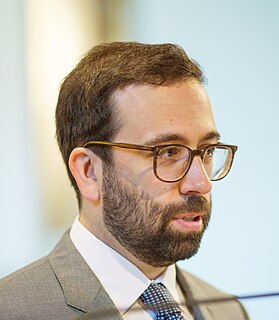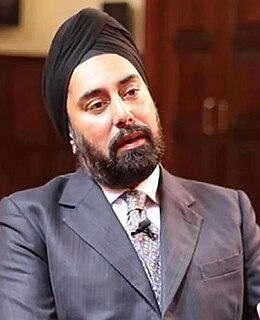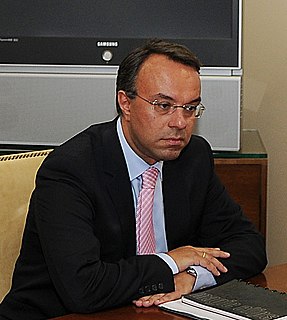Related Research Articles

The Bank of England is the central bank of the United Kingdom and the model on which most modern central banks have been based. Established in 1694 to act as the English Government's banker, and still one of the bankers for the Government of the United Kingdom, it is the world's eighth-oldest bank. It was privately owned by stockholders from its foundation in 1694 until it was nationalised in 1946 by the Attlee ministry.

A central bank, reserve bank, or monetary authority is an institution that manages the currency and monetary policy of a state or formal monetary union, and oversees their commercial banking system. In contrast to a commercial bank, a central bank possesses a monopoly on increasing the monetary base. Most central banks also have supervisory and regulatory powers to ensure the stability of member institutions, to prevent bank runs, and to discourage reckless or fraudulent behavior by member banks.
David Kenneth Miles is a British economist. Born in Swansea, he has spent his working life in London, in teaching, business and the public sector. He is a Professor at Imperial College London, and was Chief UK Economist of Morgan Stanley bank from October 2004 to May 2009. He was appointed to the Bank of England's interest-rate-setting Monetary Policy Committee (MPC) from 1 June 2009 to June 2012 and again from June 2012 to 31 August 2015, before being replaced by Gertjan Vlieghe. According to the Bank of England, "As an economist he has focused on the interaction between financial markets and the wider economy."

Ricardo A. M. R. Reis is a Portuguese economist and the A. W. Phillips professor of economics at the London School of Economics. In a 2013 ranking of young economists by Glenn Ellison, Reis was considered the top economist with a PhD between 1996 and 2004., and in 2016 he won the Germán Bernácer Prize for top European-born economist researching macroeconomics and finance. He writes a weekly op-ed for the Portuguese newspaper Jornal de Notícias and participates frequently in economic debates in Portugal.

Frederic Stanley "Rick" Mishkin is an American economist and Alfred Lerner professor of Banking and Financial Institutions at the Graduate School of Business, Columbia University. He was a member of the Board of Governors of the Federal Reserve System from 2006 to 2008.

Willem Hendrik Buiter CBE is an American-British economist. He spent most of his career as an academic, teaching at various universities. More recently, he was Chief Economist at Citigroup.

Randall S. Kroszner is a former member of the Board of Governors of the Federal Reserve System of the United States. He was chairman of its Committee on Supervision and Regulation of Banking Institutions during the global financial crisis. He took office on March 1, 2006 to fill an unexpired term, and stepped down on January 21, 2009. Kroszner has been professor of economics at the University of Chicago since the 1990s, with various leaves, and named Norman R. Bobins Professor of Economics at the University of Chicago Booth School of Business in 2009, and serves as a senior advisor for Patomak Partners.
Otmar Issing is a German economist who has been serving as President of the Center for Financial Studies since 2006. As the former Chief Economist and Member of the Board of the European Central Bank (ECB) Issing developed the 'two pillar' approach to monetary policy decision-making that the ECB has adopted.
John E. Floyd is a Canadian economist and member of the University of Toronto faculty.

Sir Howard John Davies is a British economist and author, who is the chairman of NatWest Group and the former director of the London School of Economics.
Peter James Niven Sinclair was a British economist. He was Professor, and subsequently Emeritus Professor, in Economics at the University of Birmingham. Previously, he had been a fellow and tutor at Brasenose College, Oxford.

Sir David Edward John Ramsden CBE is a British economist and has been Deputy Governor for Markets and Banking at the Bank of England since 4 September 2017. He was previously Chief Economic Adviser to HM Treasury and Head of the Government Economic Service, having previously served as Joint Head of the Service with Vicky Pryce, formerly Chief Economic Adviser and Director-General at the Department for Business, Innovation and Skills.

Mahamudu Bawumia is a Ghanaian economist and banker and the current Vice President of Ghana. He assumed office on 7 January 2017.
Patrick Honohan is an Irish economist and public servant who served as the Governor of the Central Bank of Ireland from 2009 to 2015. Since 2016, he is a nonresident senior fellow at the Peterson Institute for International Economics.
Ross Levine is an American economist who currently holds the Willis H. Booth Chair in Banking and Finance at the University of California at Berkeley. He is also a Senior Fellow at the Milken Institute, a member of the Council on Foreign Relations, and an advisor to the World Economic Forum. As of 2018, he is the 12th most cited economist in the world.

Jagjit Singh Chadha is a British economist who is the Director of the National Institute of Economic and Social Research.

Christos Staikouras is a Greek economist and politician who is currently New Democracy's Coordinator of Economic Affairs. Since the 2007 legislative election, he has been a Member of the Hellenic Parliament (MP) for Phthiotis. After the 2019 election, he was appointed Minister for Finance in the Cabinet of Kyriakos Mitsotakis.

Patrick James Keogh, MC was principal of the Bank of England's Discount Office from 1967 to 1974 during the British secondary banking crisis of the early 1970s. In 1974 he took early retirement after being blamed for failing to foresee the crisis.
The Report of the Committee on the Working of the Monetary System is a report published in 1959 about monetary policy and the workings of the Bank of England. It is named after its chairman, Cyril Radcliffe, 1st Viscount Radcliffe. The report started collecting evidence in 1957 and was the result of dissatisfaction with the workings of monetary policy in the 1950s. It still today remains an important reference document on the Bank of England.
Michael David Bordo is a Canadian and American economist, currently Board of Governors Professor of Economics and Distinguished Professor of Economics at Rutgers University. He is a Research Associate at the National Bureau of Economic Research as well as a Distinguished Visiting Fellow at the Hoover Institution at Stanford University. He is the third most influential economic historian worldwide according to the RePEc/IDEAS rankings. He was a student of Milton Friedman and has co-authored numerous books and articles with Anna Schwartz.
References
- ↑ Nelson College Old Boys' Register, 1856–2006, 6th edition
- 1 2 3 "Forrest Capie". Cass Business School City University London. Retrieved 8 November 2013.
- 1 2 "Prof Forrest Capie". Debrett's People of Today. Debrett's. Retrieved 8 November 2013.
- ↑ Cole, Robert (29 December 1999). "Think-tank will help shape Tory economic policy". The Times. p. 40.